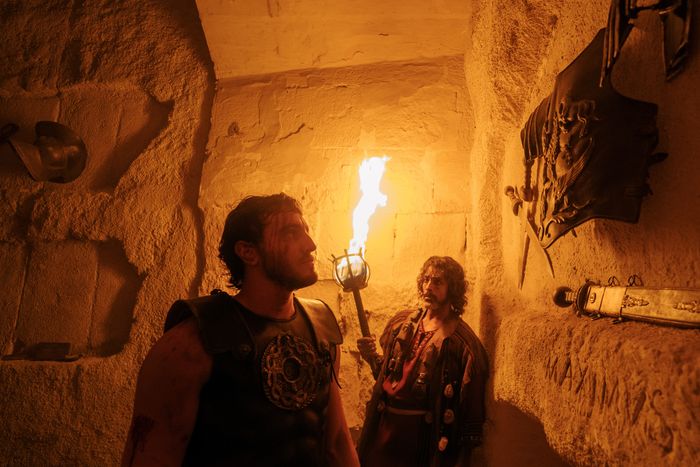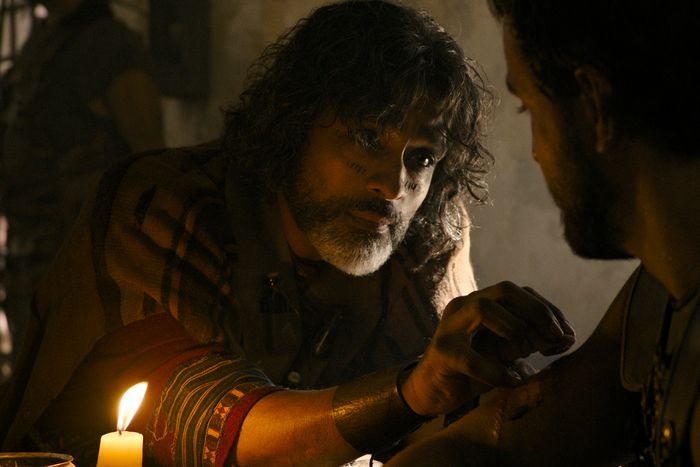
Spoilers follow for Gladiator II, released in theaters on November 22.
Gladiator II muffles Paul Mescal and his character, Lucius Verus, in a very heterosexual plot, with every element meant to amp up his obsessed-with-the-Roman-Empire trauma. His wife gets fridged in the opening minutes. His beautiful mother abandoned him as a child, remarried a hot military hero, and then seemingly never wondered where her lost son was. Every villain is a little bit gay. These are not conditions conducive to the particular delights of watching Mescal on screen.
Mescal thrives as sensitive, engaged, melancholy but trying, leaning forward to hear you talk and really look at you types. The Irish heartthrob only gets to lean into that persona opposite one character in Gladiator II. When he’s with them, he twinkles and preens. He leans over a bit so their gazes are unbroken; he holds his body steady — and doesn’t pull away — when they touch. Mescal looks more engaged in these scenes than he does in all the rest of the movie, with a noticeable difference on his face from the vague expression he wears when he’s delivering gobbledygook speeches about the “dream of Rome” or how irritated but not quite rageful he seems during the gladiator fights forced on him by grasping war profiteer Macrinus (Denzel Washington). Mescal is serviceable in those action sequences, but there’s a disconnect between his body and his face, a sense that he’s swinging a sword around when he’d really rather be sitting down and talking to someone seriously and vulnerably.
That’s Mescal’s bag, and amazingly (and a little ironically) for a movie this committed to straight-guy nonsense, Gladiator II offers us the full Paul Mescal experience solely when he’s angled that distinctively disheveled mullet toward his character’s most selfless ally … who happens to be the gladiator turned doctor treating his wounds. Lucius and Ravi shippers, my people, where you at?
Mescal, bless him, is trying his best to connect with anyone onscreen who will give him a little something back. But because of how Gladiator II ships him around the Roman Empire and keeps killing the characters Mescal could have chemistry with, Lucius spends the first half or so of the film in a weird static zone where he repeatedly denies his ancestry and chases after his mother’s new husband (Pedro Pascal), whom he’s incorrectly labeled as his mortal enemy. Lucius’s Bedouin wife played by a definitely not Bedouin actress? They get a scene or so together (and exchange the horribly clunky vow “Where death is, we are not”) before she’s offed. The Numidian chieftain who seemingly raised Lucius? He loses his will to live nearly immediately after being captured and lets a feral baboon kill him. Mescal and Pascal don’t have enough time together to develop any rapport, and Washington is a hurricane of energy and maximalism who totally overpowers Mescal in every scene they’re both in. All the rhythms of Lucius’s relationships are off — until Alexander Karim’s Ravi appears.
In terms of characters from the first Gladiator, Ravi is like a mash-up of Oliver Reed’s Proximo, Djimon Hounsou’s Juba, and Tommy Flanagan’s Cicero in his understanding of the brutality required to be a gladiator, his immediate loyalty to Lucius, and his wariness about the idea that Rome could change. He has to bear the weight of too much exposition and dot-connecting. But still! When Ravi gently cleans a sword slash on Lucius’s arm and offers him opium for the pain, Mescal transforms his character into someone suddenly paying attention to the person in front of him, noticing what they say and engaging with them on their own welcoming terms. Is Ravi saying “In your current state, I could best you now” sort of flirty? Mescal plays it like it is, with his wide grin and amused attitude. Something similar happens when Ravi explains that he bought his way out of fighting and became a doctor because “I met a woman” — Mescal’s rejoinder, “There’s always a woman,” feels both gently mocking and a little knowing. You can practically imagine a wink at the end of it. And if I told you that Lucius teasingly calls Ravi “old man,” gives him a treasured family ring, and then asks for his keys? Well! I look forward to the “swingers” tag on your AO3 story.
I’m mostly joshing, but the chemistry between Lucius and Ravi encapsulates the film’s biggest problem: It doesn’t let Paul Mescal be Paul Mescal. He’s at his best when he’s operating in complementary modes of coy, chummy, and bashful and pensive, doleful, and wistful, and he gets the opportunity to play those ranges when Lucius is revealing his dreams and regrets to Ravi. He trusts this doctor with his life and then eventually with his plans to protect Rome from Macrinus, and in their relationship, Mescal is allowed to be proactive in the ways he’s most effective as an actor. Those clunky speeches aren’t it. The underdeveloped relationship with his wife and his mother aren’t it. Gladiator was a big, sentimental, sincere movie about the genuine and valorous camaraderie between men who risk their lives for each other. Gladiator II tries to mimic or evoke a number of its predecessor’s beats, but it never quite masters how and why men relate to one another and what qualities they see in other men that inspire loyalty and sacrifice. The closest thing we get to that old Gladiator feeling is found in Lucius and Ravi — even if they don’t kiss.
More on Gladiator II
- Gladiator II Enters the Paramount+ Coliseum
- The BAFTAs Went Bananas for Monkey Movies
- Dear Paul Mescal, Please Just Admit You Want to Be in a Broadway Musical



